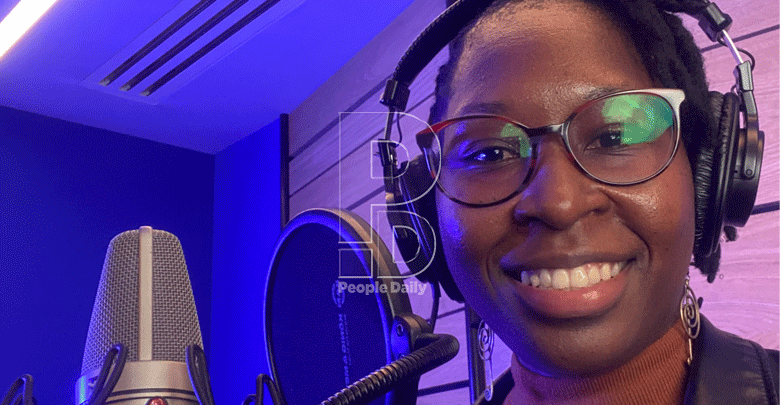Though Cynthia Kimola nurtured her voice over talent from just being a side hustle to her dream career
By Milliam Murigi, August 10, 2021
As a child, Cynthia Kimola was always intrigued whenever a commercial played on radio or TV. She would imitate voice over artist and even give the advert her own spin.
Because of this, many people around her and even herself thought that her ideal career was journalism.
That is why after her secondary education in 2008, she joined Daystar University to pursue journalism.
At the campus, her favourite place was the university radio station, Shine Fm.
This is where she nurtured her love for audio and ended up reading the radio news, hosting a hip-hop show, and heading the programming unit.
This is also the place that introduced her to the beautiful and creative world of voice overs something she started doing for fun. Later, she secured a job at Classic 105 as a news presenter.
“I used my voice-overs clips as my demos and they helped me land my first national radio news job in 2012.
The demos also helped me get booked for my first national TV commercial the same year,” recalls the 31-year-old.
Pushing the limits
Even after landing a well-paying job, she never felt as if she was doing justice to her voice. She always wanted to record herself.
With limited on–air time as a news presenter, she decided to make voice-over work her side hustle.
Today she is one of the most sort professional African voice over artiste. What also started as a side hustle has now become her main hustle.

Her voice has been used in various Kenyan, regional and international TV and radio ads, eLearning projects, features, documentaries, explainer videos, podcast intros, phone prompts, animations, and audiobooks.
She also offers live directed sessions via Zoom, Skype, or Microsoft Teams. Cynthia records voice-overs in English and Kiswahili languages.
She can do various accents including English with an African accent, English with a Kenyan accent, English with a West African accent, English with a South African accent, Kiswahili in Kenyan accent and Kiswahili in a Tanzanian accent.
“I have over 10 years of experience, but I decided to pursue voice-overs seriously last year (2020) after I recovered from Covid-19.
I made the conscious decision because the pandemic realigned my priorities and voice-over work was top of my list of things I absolutely love to do.
So, I decided to purposefully utilise my gift, that is my voice,” Cynthia shares.
She reveals that she is passionate about voice overs because she gets to use her voice to help individuals, small businesses, and large corporates to convey their messages across to audiences.
She’s also always exhilarated to use her voice to help bring other people ideas to life, ensuring they are not just words on a script, but a wonderful story with a lifeline.
Covid-19 opportunities
Her voice over work can run from 8am to10pm. That is when she does auditions, voice projects she has been awarded, and communicates with clients in their different time zones.
The best thing about her job is that no day is typical in the voice-over world, one day she could be doing a radio or TV ad, another an eLearning project, the next a documentary or video game, or none at all. This helps her break the monotony.
“I love voice-over work because I feel like that’s what I’m supposed to do. It doesn’t feel like a job.
I love the freedom it affords me to be creative with my voice and to work remotely.
The networking and connections it has exposed me has allowed me to work for local, regional, and international clients,” she says.
For Cynthia, a happy and satisfied client is what makes her press on. To ensure that she attracts more clients, she displays her work on various platforms and the trick has really worked.
However, all this has not been without challenges with the biggest being equipment malfunctioning.
According to her, a terrible sound can lead one to miss out on a job. Other challenges are overdue payments because of prolonged processes and time differences when working with international clients, but she has been forced to adapt to this.
Are there any particular qualifications needed for this job? Cynthia says that a good voice, interest, practice, and patience are all one needs to succeed in this sector.
But though a good voice can get you gigs, you have to practice to refine it. Also, one has to work on her reading speed since this helps one go through the script faster and internalise it before recording.
Apart from that, basic audio concepts knowledge is an added advantage since the sector is moving into self-producing with home studios.
“If you want to become a voice-over artiste, start by doing demos. You can also walk into a studio and tell them you are interested to be added to their voicebank. Finally, sign up to voice-over sites to find work,” Cynthia advises.
Cynthia advises up-and-coming artistes who would like to venture in her kind of work to always have a good broadcast microphone if they are recording from home, and ensure that the space they are using to record is soundproof. This helps one get the best optimal audio.